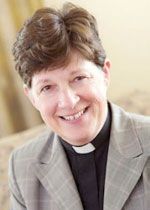How Will People Know?
 On Wednesday, Aug. 10, the voting members of the 2016 ELCA Churchwide Assembly received the document “Declaration on the Way.” More than 99 percent of us affirmed this significant ecumenical statement in which Lutherans and Roman Catholics have achieved agreement on 32 issues regarding communion, ministry and the church, declaring that these are no longer church dividing. Fifty years of ecumenical dialogue in the United States and around the world led to this point.
On Wednesday, Aug. 10, the voting members of the 2016 ELCA Churchwide Assembly received the document “Declaration on the Way.” More than 99 percent of us affirmed this significant ecumenical statement in which Lutherans and Roman Catholics have achieved agreement on 32 issues regarding communion, ministry and the church, declaring that these are no longer church dividing. Fifty years of ecumenical dialogue in the United States and around the world led to this point.
When asked if declaration was a step closer to eucharistic sharing between Lutherans and Roman Catholics, Bishop Denis Madden, Catholic co-chair of the dialogue task force, answered, “Yes.” There were tears of joy. The assembly responded with a standing ovation.
Later that day this question was asked during the press conference about the assembly’s action on the declaration: “How would this historic agreement be made known and affect the lives of the ordinary person in the pew?” How does the work of theologians and the decision of a churchwide assembly become part of the lived experience of Lutheran and Roman Catholic parishioners? What is to prevent this significant action from becoming just one of several feel-good moments shared by voting members in August 2016?
And what about all of the other important decisions that were taken? What about the AMMPARO initiative and the creation of a unified word and service roster? What about memorials calling the ELCA to deepen relationships with the Historic Black Churches, to repudiate the doctrine of discovery, to work toward a responsible energy future, peace with justice in the Holy Land, to welcome refugees, to support military personnel, veterans and their families, to welcome the gifts of African-American ELCA members and to look at those structures within this church that erect barriers to full inclusion?
And what about all of the other wonderful non-legislative events at the assembly—a call for the ELCA to read Martin Luther’s Small Catechism together from now until Oct. 31, 2017, the call to action by Nobel laureate and Lutheran Leymah Gbowee, the reports of ELCA World Hunger and Lutheran Disaster Response, the lives we are reaching and changing through Always Being Made New: The Campaign for the ELCA? The churchwide conversation we are having about priorities in the Called Forward Together in Christ process?
The assembly wasn’t a national political convention, rather it was the people of God gathered daily around word and sacraments, engaged in prayer, and open to the movement and guidance of the Spirit.
But I return to the questions asked during the press conference—how will people know about what happened during this assembly and how will these actions and experiences become a part of our life together?
This isn’t the first time I’ve heard this question or others like it. It’s as if people want or need or expect some kind of directive or program or even permission from someone (the presiding bishop?) or somewhere (the churchwide organization?) to bring all of these things to light and life in their congregations. It doesn’t have to be that way. About 960 voting members and almost 500 Grace Gathering participants along with visitors, presenters and staff attended the assembly. Close to 2,000 people, the majority of whom are members of ELCA congregations, saw and heard what happened in New Orleans. Thousands of you are reading about the assembly in this issue of Living Lutheran. Get mobilized.
If exploring Declaration on the Way with the local Roman Catholic parish is your passion, get a couple other members of your congregation and offer this to your pastor, “Pastor, we think this is important and we want to work with you. We’ll organize the event, logistics, invitations, publicity, speakers, format, even refreshments!” You can do the same in your conference or synod. The point is we are all the ELCA. The work belongs to all of us. Let’s get busy!
Share this with your friends:

